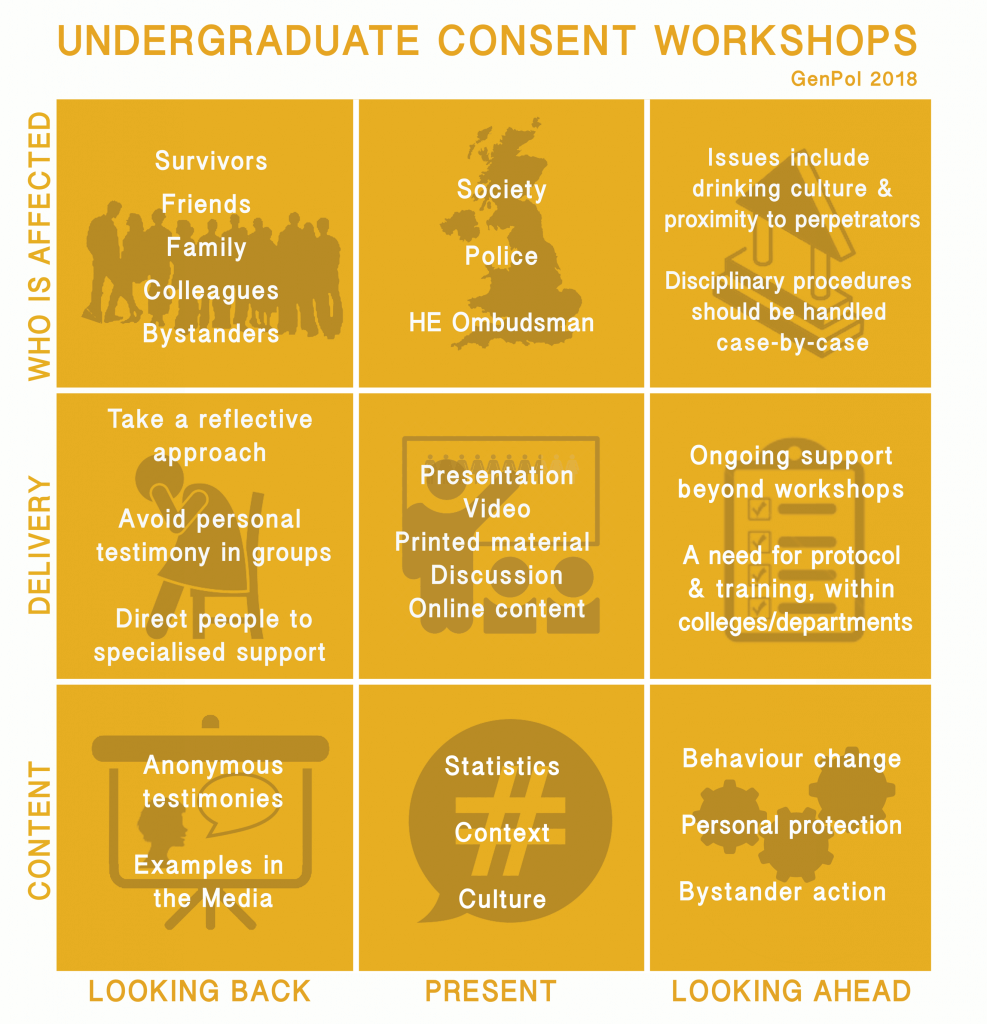
Read about our latest research into sexual violence in UK universities – and how to end it – in Ellen Davis-Walker’s blog for the Huffington Post.
[image credit: HuffPost, Getty images]

Read about our latest research into sexual violence in UK universities – and how to end it – in Ellen Davis-Walker’s blog for the Huffington Post.
[image credit: HuffPost, Getty images]

Having recently completed a summer internship at GenPol, I can now look back and reflect on my experiences. My role was to conduct research on whichever major projects were happening at GenPol HQ that week. I had known that GenPol was a broad and dynamic think tank, but it was not until I began my internship that I realised just how many different projects and ideas were on the go. This was something that really struck me, not only because of GenPol’s of relatively compact team, but also because despite having fingers in many different pies, the team remained organised and focused. GenPol is a bold and ambitious social enterprise and I feel proud and privileged to have been a part of it.
The work I carried out varied from week to week. The first week was focused on a project in collaboration with the African Technology Business Network. This was in relation to a new proposal that highlighted the importance of digital literacy, with regards to 6 chosen African countries. The project was concerned with how the increasing gender gap is widened by the lack of digital literacy amongst young girls, putting them even further behind their male counterparts.
I then was put on a project to study sexual harassment and bullying in the Arts. This covered a huge range of industries from music to theatre, to art and writing and much more. I uncovered research regarding what is commonly known as the ‘Superstar Effect’. This is when certain people high up in the industry are seemingly ‘allowed’ to behave often highly inappropriately due to the idea of these people as ‘creative geniuses’. In other words, their actions are excused because of the teleological consequences: their ‘masterpiece’. As the Arts are highly unregulated and saturated with freelancers, no formal structure is in place for reports to be made in the instance of abuse. We also came up with a ‘business case’ for why it is important that this abuse must stop: women are so often weighed down by this negative treatment, that it so often infiltrates their work. We thought to ourselves, how much more creative talent could we unlock by allowing women the same freedom many men have, to simply create, absolved of their negative experiences?
The majority of my internship with GenPol was focused on how Relationships and Sex Education (RSE) at schools, and consent workshops at universities can be improved. This was for an upcoming policy meeting with the Department for Education. This meeting would in part inform a publication that I was fortunate enough to become a co-author of: GenPol’s most recent report on Consent Training and Sexual Violence Prevention in U.K. Universities.
Despite the increase in consent training on a national level, the statistics remain harrowing. 70% of female students and recent graduates have experienced sexual violence, whilst 8% have been raped at university. Through dialogue with practitioners in the field, as well as our workshops, we quickly discovered that consent workshops were being seen as increasingly effective methods in preventing sexual violence at universities, with more universities adopting similar practices year on year. We recognised that universities not only have a crucial role to play in assuring their students are protected from sexual violence, but a responsibility to do so in order to provide a safe and inclusive environment for all their students. Furthermore, we recommended that university staff members attend compulsory training on gender-based violence, with specially trained therapists to support survivors of sexual violence.
GenPol has taught me the value of high quality varied work. I had always been one of the only people in my family and friendship circle to see the infiltration of patriarchy in everything, whether it would be whilst watching TV, reading an advert on the tube, or even just walking down the street. Working at GenPol pushed this ability even further to look at everything, and I mean everything, from a gender lens. I further recognised how questions of patriarchy, gender and sexism are embedded in the fabric of our society. Those at GenPol are aware of this at all times, and I am too.
Now more than ever.
Lily Rosengard
Summer 2018 Intern

We are delighted to present GenPol’s report on consent training and sexual violence prevention in British universities. Through desk research, focus groups, workshops, and an online survey, we have aimed to assess how current training practices help prevent sexual violence on campus, and what else could be done to support practitioners and enhance the impact of prevention work. This report was born from the collaboration between GenPol and Dr Tom Dougherty, a philosopher who researches consent at the University of Cambridge. It has seen us working for many months with university staff, students, trainers, sexual violence experts and gender equality activists.
Our commitment to ending sexual violence
As think tank researchers and gender equality advocates, at GenPol we work closely with universities, their students and personnel. Many of our researchers are, or have been, academics, and many of our interns study at, or have just come out of, university. Thus, we are painfully aware of the existence of sexual harassment and assault on campus. It saddens and outrages us beyond words, and we are committed to do our bit to end it. We hope that this report may be a useful tool for peer-to-peer trainers, student leaders and activists, as well as for sexual violence professionals and all those who work to tackle gender-based abuse in all its forms. We dedicate it to all victims and survivors, whose courage and resilience is a never-ending source of inspiration.
Our findings
Our data analysis clearly shows that consent training is increasingly perceived as an effective violence prevention tool by trainers and beneficiaries alike, and adopted by more and more universities nation-wide. We identified a number of good practices for consent workshops, including break-away group discussions, scenario and myth-busting exercises, and the use of national and local statistics on assault and harassment. However, our report also highlights existing challenges and areas for improvement. These include the reluctance of (mostly male) students to attend consent workshops, existing time constraints, and the fact that trainers struggle to find a suitable language and cover a plethora of complex topics.
Above all, we found that training as a stand-alone tool is not particularly successful. In fact, trainees turn cynical and lose motivation if they do not see their institution truly committing to address the problem, and an institutional culture of sexual respect is not developed. Specifically, our respondents complained about the fragmentation of sexual violence reporting mechanisms and disciplinary procedures across universities, and even colleges within the same institution. They also felt that specifically trained personnel and sexual violence professionals (including therapists) should support consent trainers.
Building on this, we issued a set of comprehensive recommendations for peer-to-peer trainers, student unions, universities, sexual violence professionals and other relevant stakeholders. They include:
For further details, please see the report below. This study is part of a broader research project started with ‘Can Education stop abuse?’, a comprehensive policy paper in which we examined the linkage between consent-centred sexuality education and gender-based violence on an European level.
Happy reading!

UPDATE: On 16/10/2018 our partnership with University Women in the Arts has officially been announced on Broadway World. Read all about it!
……………………….
18/07/2018. We’re excited to share BroadwayWorld‘s article on our partnership with University Women in the Arts!
Jennifer Tuckett, Director of University Women in the Arts: “We are delighted to be working with GenPol on this panel event as part of our new major project we are running with GenPol on how to prevent abuse in the arts. We hope the panel will offer important advice for female arts students, women wanting to work in the arts, and those who work with them in the education sector and arts industry”.
Lilia Giugni, CEO of GenPol: “We are thrilled to be partnering with University of Women in the Arts to help prevent sexual and gender-based violence in the art industry. Discrimination, sexism and actual abuse undermine the lives and careers of too many women artists. We hope the panel will offer a little taste of the forthcoming book on which we are working together and the solutions we propose.”
Read the full article here and join the panel discussion on July 20th 2018 as part of London Writers’ Week. Panellists also include The Guardian Higher Education Network editor Rachel Hall, playwright, mentor and Learning and Participation Manager at the Ovalhouse Theatre Titilola Dawudu, and playwright, Artistic Director and BBC New Talent Hot List writer Jingan Young.
[image credit: amira_a]

You may remember that GenPol teamed up with our friends at SOS Music Media to record a live podcast on the role men can play in advancing gender equality?
If you didn’t manage to get a ticket, don’t worry! You can now listen to it here.
With huge thanks to everyone at SOS Media and The Cambridge Centre for Social Innovation who were our event sponsors. Don’t forget to share the podcast on social media (and give us a follow on Facebook , Twitter or Instagram if you haven’t already)

GenPol are teaming up with University Women in the Arts at London Writer’s Week for a panel discussion to explore how we can improve the transition for women from studying the arts to working in the arts.
Panellists will include our CEO Lilia Giugni- who will be discussing sexual harassment in the industry- as well as the editor of The Guardian’s Higher Education Network Rachel Hall, playwright, mentor and Learning and Participation Manager at the Ovalhouse Theatre Titilola Dawudu, and playwright, Artistic Director and BBC New Talent Hot List writer Jingan You.
Join us on Friday 20th July, 2pm –3pm, at the Diorama Arts Centre, Regent’s Place, 201 Drummond St, Kings Cross, London NW1 3FE, UK.
Price: £5 (or included in the Festival Pass or Day Pass)
Get your tickets for the event here

This week, we spoke to Dr Terri Simpkin about overcoming ‘the Impostor Phenomenon’. Terri is the Higher and Further Principal at CNet Training and a Visiting Fellow at Anglia Ruskin University. She is actively involved in developing programmes to advance the status of women STEM occupations including her own Braver, Stronger, Smarter programme to diminish impostor phenomenon. Terri is also working on a suite of research to inform emerging workplace structures in the ‘Second Machine Age’.
Her comments resonated deeply with so many of us, and we hope you will take away the same reassurance and sense of power that we did.
Can you tell us a little about your current research in to women in STEM? How did that come about?
My current project came about with a move to develop a master’s degree in leadership specializing in data centre management. At industry seminars or at panels, I’d look out over a sea of white middle-aged men, and I’d find myself thinking ‘where are all the women, why is there such a visible lack of representation in operations, IT and engineering at all levels but particularly in key roles?’ I started looking at imposter phenomenon- there is so much good work going on in STEM to get women in to the industry (as graduates, girls in schools) but that doesn’t seem to be making a difference fast enough – I ended up asking ‘what’s going on? Why are we not seeing a marked shift in terms of women occupying non-traditional and higher level posts?’
So, I replicated a piece of research done in 70s using the same diagnostic to see if there was a problem in the data centre sector. Ironically enough I couldn’t collect enough data from women in these centers for me to complete the study, so I re-expanded it to include women in broader STEM occupations. From that work I discovered that 89% of women were experiencing, or had or experiences of the imposter phenomenon.
What is the Imposter Phenomenon?
It’s mostly fear. A fear that, at any given point in time, someone is going to tell you ‘we should have given the job to someone else’, or experiencing a sense of crushing fear of failure succeed despite a track record of past achievements. There are so many women who want to occupy Senior Leadership Positions but feel totally exposed by the pressure of having to meet their own incredibly high standards of absolute perfection.
But it’s not about ‘fixing women’. We’re taking these findings into work places to try and raise awareness of how the systems and processes are stopping women from making progress. This idea that ‘you must be perfect’ is a fear so many of us relate to, and that is common across so many types of work. Every time I run a session I stay behind for a good hour as I have so many women suggesting I’ve put words on everything they’ve been feeling. Putting a name to Imposter Syndrome is important: diminishing this preconception that women need to be more confident, that the fault somehow lies with them, is even more so. Women have confidence but sometimes they don’t have a sense of self-efficacy. They’re confident they can progress in leadership but less sure about whether they’ll be able to make the situation work for them, and whether the systems in place and the odds at stake can work in their favor, and that’s an entirely different narrative to women lacking confidence.
Why is this such a common phenomenon? How is it that so many of us will be able to relate to the scenario you’ve just described?
At lot of it comes back to socialization, and that’s a big problem to solve! The way women and girls are raised, treated in schools and at home and in the public media. Generally speaking, a lot of us are taught to be one way: even if you challenge those ideas the social messages and expectations are still pervasive. Challenging those preconceptions means pushing against pre-determined ideas about how (and what) women should be in the workplace, and how they fit into the workplace. Things like rewards, recognition and promotion plans are geared towards a typically ‘male’ kind of management. I’m often asked by very well-meaning men why women don’t apply for senior management positions. Often it’s because those job descriptions identify what’s still seen as a typically male profile (out there strong, visible, assertive, aggressive). Yet for most of living memory, women have been told that ‘nice’ girls don’t do that kind of thing. It often comes to a choice between being seen as being more masculine or not putting yourself in that role. High profile leadership positions are highly visible, open to criticism, and many women are saying ‘you know what, I’d prefer not to put myself in a position where I am open to ruthless criticism, I don’t want to fail in a very public manner’ even though the chances of them failing are actually very slim indeed. It’s robbing people of career progressing and our organizations of some outstanding talent.
So do you think the problem could lie in the type of working environments women find themselves in?
The workplace structure still carries a gender bias, and a socialized imposter syndrome exacerbates it. When you break it down people are socialized in a certain way, and when it’s challenged that causes people a lot of discomfort. The fact remains that in many cases this bias prevents people doing the jobs they could do, particularly in STEM which still has a huge gender disparity.
They are still generally engrained of ways of looking at confidence. Women are still expected to be liked, women who are confident and competent are not liked. It’s the old adage, a man is considered strong and decisive, women are considered ‘bossy’ and ‘bitchy’. It’s a classic double bind.
That’s sort of where the image of the 80s, power suits and padded shoulders alpha female came from, wasn’t it?
Exactly! But we’re still seeing those kinds of attitudes today. Look at the scrutiny that May and Merkel get in comparison to male counterparts (look at what Boris Johnson can get away with…)
Our sense-making comes down to what we see and what seems plausible. Ultimately women are approaching these positions with a lack of plausibility- high level, successful women in business and politics for example are not visible due to being in the minority so it doesn’t seem likely to others. If we look In to STEM occupations for example, we see very few women at a high level, and as a result we tell ourselves that it is not probable that we could get that position. What’s plausible and what’s real are two different things. Sadly, when we make sense of the world, plausibility, no matter how wrong, eats accuracy for breakfast!
What can we, and our readers, do to feel more plausible? What would your top tips be?
Know it’s not in your head, it’s perpetuated by the way our social structures and workplaces are set up. This is not about fixing women. Look at your achievements and successes from the past. If, despite a raft of successes you continue to believe the next task will be a failure, sit down and really critically look at all the success that have gone before.
Write up your CV, take your name off it and ask someone else what they think of the achievements identified. Take note of their rational, unbiased account of successes and talents on the CV. The key thing is to critically examine your achievements and previous successes and accept that the success is yours and, more than likely, replicatable.
Stop saying ‘but’ when someone says you did a good job it can be too easy to say ‘thanks, but I just got lucky, or it was someone else…’. Just accept the praise! No buts! Once you start setting up changes in language you set up changes in behaviors, so accept that praise. This sort of thing is easy to say, but harder to enact, so maybe think about getting a mentor (someone who has no vested interest in being nice, but who can give constructive, personalized feedback that’s rational and honest).
How can organizations and businesses, take steps to eradicate Imposter Syndrome?
We need to going back to the beginning to strip out gender bias. We need to advance women on non-nebulous terms (feedback grounded in measurable terms). People with imposter phenomenon are experts about making themselves right about how inadequate they think they are, so we need to present them with clear measurable proof to the contrary.
We also need to change the narrative around it being women’s responsibility to change themselves, workplaces haven’t adapted to changes in the industrial landscape and systems are still founded on the values of postindustrial age. With things like VR, robotic path automation, artificial intelligence expanding at a rate of knots these values aren’t tenable. I feel that if you’re going to break the traditional system you ay as well rebuild them in a guise that strips out a pervasive gender bias.
My own research is moving towards looking at how organizations need to prepare for the 4th industrial revolution, where many traditional systems don’t work anymore. I think that If you’re challenging male structures you also challenge female structures and move towards a working culture that dismantles this gender binary and gendered expectations. I disagree with the statement that ‘the future is female’ however well-intentioned that might be. We need to move past that. The future is collective, human, and it’s up to us to work towards it.
Finally, Post #MeToo, do you think the tide has started to turn for women in business, or do we still have a long way to go?
Well, we’ve still got 217 years to go until we reach gender parity if we go at the same rate we’ve moved it since (some) women got the vote in 1918. It’s true that women are gaining more traction in terms of getting their views across, and men, broadly, are questioning some of the things they’ve learnt implicitly. Most people don’t set out to be bigots or anti-feminist or sexist, they’ve been conditioned into a way of thinking. The challenge is looking outwards to the world as opposed to looking at the individual in front of us. If we take the example of the Brock Turner case, I think many men started to ask, why is his future more important than the future of the woman whose life he has irreparably damaged? It’s not on women to adapt or modify themselves, but for individuals to be held accountable, as we’ve also seen with the Harvey Weinstein backlash. I think those examples are challenging these ingrained perceptions of women’s place in the world. It’s making people realise how stupid and damaging this archaic mindset always was.
Momentum is gearing up. People, not just women, are questioning some of the values and ideas we’ve taken for granted. That can only be a good thing -and it can’t come quick enough.
[photo credits: Terri Simpkin]

GenPol’s research associate Nathalie Greenfield has been featured on yet another major international outlet, this time EUobserver. Nathalie has written before about the need for better sexuality and relationship education, and she makes a strong case for a comprehensive European effort.
Read more by Nathalie
[image credits: EUobserver]

We are delighted to announce that GenPol will partner with the University Women In the Arts, a mentoring scheme to help improve women’s transition from studying the arts to working in the arts, on an exciting new project for 2018 – 2019. This twelve-month study aims to help female arts student, as well as organisations that support them, to deal with, tackle and help eradicate abuse, bullying and harassment within the industry.
Read more about it in this piece by Rachel Hall for The Guardian.
As pointed out by Jennifer Tuckett, Director of University Women in the Arts, “Research conducted as part of recent discussions around abuse in the arts has shown that it is often those at the start of their careers who are affected by abuse. We hope our 12 month project will allow us to provide a platform for female arts students to share their views and experiences of abuse, bullying and harassment, as well as providing a toolkit in partnership with GenPol to help teachers at school and university level to equip their students to deal with this issue and help tackle and eradicate bullying, abuse and harassment in the arts. In terms of equipping the next generation going into the arts, education has a huge role to play in tackling this issue”.
Our CEO Dr Lilia Giugni added: “As shown by GenPol’s latest report, over 50 million European women have experienced physical, psychological or sexual violence in their lifetimes, and education is crucial to prevent these abuses. While the #metoo campaign has made the world aware of the extent of gender-based violence, especially within the art industry, we now need to move the debate forward and talk solutions. Wonderful resources for effective education in this area already exist, and we do not need to reinvent the wheel. However, we do need outlets and network to exchange good practices, and more funding for research in this area. Our collaboration with the University of Women in the Arts is an exciting step forward in this direction”.
The project begins with a call out to female arts students studying at universities across the UK or who have graduated in the last two years to submit work inspired by their views and experiences of abuse, either in the arts or more generally. Chosen submissions will be published in a book to provide a platform for female arts students views and experiences, alongside a tooklit for use by teachers at school and university level or for use by students on their own.
The project will be advised by Professor Pamela Burnard, Professor of Arts, Creativities and Education at the University of Cambridge and one of the world’s leading experts on arts education. Co-editors of the book to be published as a result of the project include Jingan Young, who recently edited Foreign Goods,a book of work by British East Asian playwrights published by Oberon Books, and Titilola Dawudu, Learning and Participation Manager at the Ovalhouse Theatre who was recently selected for the Artistic Director Leadership Programme’s “Leaders of Tomorrow” scheme.
[photo credits: Malaika Shaw was a winner of the PRS Foundation’s Women Make Music fund. Photograph: PRS Foundation]

[Live podcast] What role can men play in advancing gender equality?
We’re proud to be featured on SOS Music Media amazing podcast series! There will be a live recording on June 25th 2018 at 5pm in central Cambridge. Our CEO Lilia Giugni will be in conversation with Tanner Taddeo of SOS Music Media, discussing ways in which men and boys can contribute to the struggle towards a more gender equal world in the wake of #MeToo.
If you’re interested in learning more about the underlying issues of gender equality and meeting individuals working on the front lines of the issue(s), then this event is for you. Come and listen to the live podcast and then discuss the issues afterwards with thought leaders on gender equality during the drinks/networking event.
Book your tickets now on Eventbrite. See you there!
In partnership with the Cambridge Centre for Social Innovation.
[image credits: SOS Music Media]
If you would like to find out more about our research, advocacy and consultancy work, we warmly invite you to get in touch. We are not advertising for vacancies at the moment. Please note that we may not able to respond to unsolicited applications.
© Gender & Policy Insights C.I.C. | Privacy policy